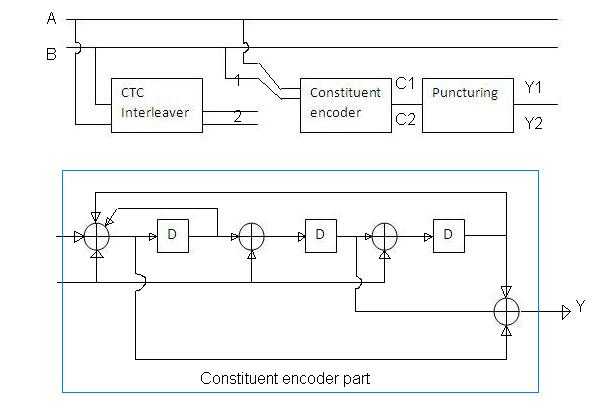CTC(Convolutional Turbo Code) basics and specifications
This section ofMATLAB source codecoversCTC EncoderorConvolutional Turbo codematlab code.
The Convolutional Turbo Code Encoder or CTC Encoder is depicted in the following figure including constituent encoder. It uses double binary circular recursive systematic convolutional code.The following is the matlab code for the CTC structure defined in the figure.

ReferTurbo encoderpage which describes basics of CTC Encoder or Convolutional Turbo Encoder technique with rate 1 by 3 example used for forward error correction.
The difference between convolutional encoder and turbo encoder is that in convolutional encoder input bits are not preserved and are altered. While in the case of turbo coding input bits are preserved and are multiplexed with other altered bits generated through encoder and (interleaver+encoder) modules.
CTC Encoder MATLAB Code
CircularStateTable = [
0 6 4 2 7 1 3 5;
0 3 7 4 5 6 2 1;
0 5 3 6 2 7 1 4;
0 4 1 5 6 2 7 3;
0 2 5 7 1 3 4 6;
0 7 6 1 3 4 5 2];
InitState = [0 0 0];
[Junk FinalState] = CTCRSCEncoder(InpBits, N, InitState);
Ri = mod(N, 7);
Ci = FinalState(1)*4 + FinalState(2)*2 + FinalState(3);
CS = CircularStateTable(Ri, Ci+1);
InitState(1) = floor(CS/4);
CS = mod(CS,4);
InitState(2) = floor(CS/2);
CS = mod(CS,2);
InitState(3) = CS;
[p1 FS] = CTCRSCEncoder(InpBits, N, InitState);
if sum(FS == InitState) ~= 3
disp('P1 mismatch')
return
end
IB = CTCInterleaver(InpBits, N, P);
InitState = [0 0 0];
[Junk FinalState] = CTCRSCEncoder(IB, N, InitState);
Ri = mod(N, 7);
Ci = FinalState(1)*4 + FinalState(2)*2 + FinalState(3);
CS = CircularStateTable(Ri, Ci+1);
InitState(1) = floor(CS/4);
CS = mod(CS,4);
InitState(2) = floor(CS/2);
CS = mod(CS,2);
InitState(3) = CS;
[p2 FS] = CTCRSCEncoder(IB, N, InitState);
if sum(FS == InitState) ~= 3
disp('P2 mismatch')
return
end
OutBits = zeros(6*N, 1);
k = 0: n - 1
OutBits(6*k+1) = InpBits(2*k+1);
OutBits(6*k+2) = InpBits(2*k+2);
OutBits(6*k+3) = p1(2*k+1);
OutBits(6*k+4) = p2(2*k+1);
OutBits(6*k+5) = p1(2*k+2);
OutBits(6*k+6) = p2(2*k+2);
end
%[ParityBits, FinState] = CTCRSCEncoder(InpBits, N, InitState)
%InitState = initial state of encoder (0 to 7) in binary
%FinState = final state of encoder (0 to 7) in binary
load 'CTCEncTable'
TNxt = CTCEncTable(:, 6:8);
TOut = CTCEncTable(:, 9:10);
ParityBits = zeros(2*N, 1);
CS = InitState;
k = 0: n - 1
A = InpBits(2*k+1);
B = InpBits(2*k+2);
m = CS(1)*16 + CS(2)*8 + CS(3)*4 + A*2 + B;
NS = TNxt(m+1, :);
Pb = TOut(m+1, :);
ParityBits(2*k+1) = Pb(1);
ParityBits(2*k+2) = Pb(2);
CS = NS;
end
FinState = NS;
%InterleavedBits = CTCInterleaver(InpBits, N, P)
%N - Length of input bit in pairs
%P - [p0 p1 p2 p3], interleaver parameters
InterleavedBits = zeros(2*N, 1);
xI = zeros(N, 2);
k = 0: n - 1
m = CTCGetInterleavedAddress(k, N, P);
A = InpBits(2*m+1);
B = InpBits(2*m+2);
if mod(k, 2) == 1
InterleavedBits(2*k+1) = A;
InterleavedBits(2*k+2) = B;
else
InterleavedBits(2*k+1) = B;
InterleavedBits(2*k+2) = A;
end
end
Useful Links to MATLAB codes
Refer following as well as links mentioned on left side panel for useful MATLAB codes.
OFDM Preamble generationTime off estimation corrFreq off estimation corrchannel estimation11a WLAN channelPN sequence generationOFDMA Tx RxAES DEScarrier aggregationCCDFFIR FilterIIR FilterLow Pass FIRViterbi decoderCRC8 CRC32
RF and Wireless tutorials
WLAN802.11ac802.11adwimaxZigbeez-waveGSMLTEUMTSBluetoothUWBIoTsatelliteAntennaRADAR